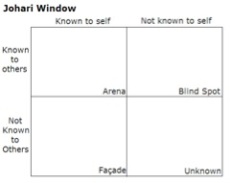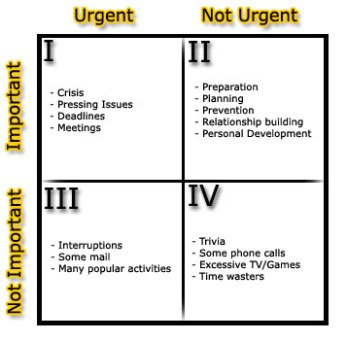Microsoft? Makes sense! Even though Apple had been using the concept of windows before Microsoft and for a long time, windows was actually an extension of MS DOS, Windows has become synonymous with Microsoft. How about windows that affect our ability to lead, however? Let’s leave the Mac lovers and Microsoft admirers to fight that windows battle while we investigate lesser known windows.
Ever heard of the JoHari window? Psychologists, team-building facilitators, and personal coaches have fun with, and make good use of, this window. Created by Joseph Luft and Harrington Ingham in 1955, the JoHari window helps people better understand their relationships with themselves and others. It is is a tool for self-awareness.
The JoHari window has four panes. Each represents what you know or don’t know about yourself and what others know or don’t know about you. Often given names like 1. The Arena (Known Knowns to self and others), 2. The Facade (Known to self but not to others), 3. The Blind Spot (Known to others but unknown to self), and 4. The Unknown (Unknown to both self and others). Not knowing is not the worst condition. Not knowing that you don’t know is worse. Defense Secretary Donald Rumsfeld often referred to knowns, known unknowns and unknown unknowns in his press conferences early in the war on terror. In business as in battle, the winners know more about what they know but it is equally important that they know what they don’t know.
Are you more familiar with Stephen Covey’s window for time management and strategic thinking? Covey’s window also has four panes. The panes represent the interaction among the four factors: Important, Not Important, Urgent, and Not Urgent. Covey named them quadrants. Quadrant I is Urgent and Important. Quadrant II is Not Urgent and Important. Quadrant III is Urgent and Not Important. Quadrant IV is Not Urgent and Not Important.
Truly strategic thinkers spend most of their time in Quadrant II, dealing with important issues before they become urgent. Many of us spend too much time in Quadrant I. That’s because we don’t plan and we allow the important to become urgent. Much too many of us waste a lot of time dealing with the unimportant.
The worst cases are unimportant items that present themselves as urgent in Quadrant III. Often, leaders allow members of their team to bring them urgent items that the team-member incorrectly assesses to be important. The natural inclination is to deal with the issue before assessing its importance. Usually, that’s a misguided attempt to save time. It is almost always worth taking a few minutes to assess importance. Experience assures me you will save time in the long run.
Are these the kinds of windows you can use? They might create or enhance opportunities. What say you?



Mike, Good one. You close with a "toes" of windows question. I think you meant another word. Not too late to fix. John
John Molino Chief of Staff, Programs Wounded Warrior Project 202-380-8299